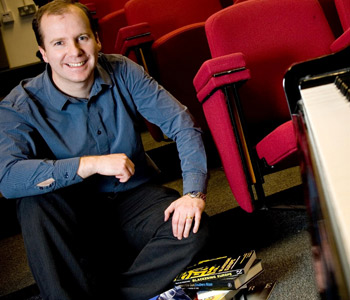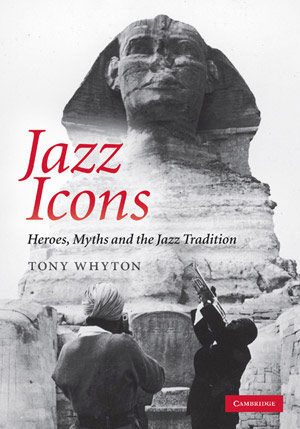
In Jazz Icons, I argue that jazz history is now dominated by iconic figures who have taken on an almost God-like status.
When musicians and fans discuss the life and music of Satchmo, Duke, Bird or Trane, they often create a mythic world where legendary jazzmen are used to tell the story of jazz.
So I explore the growing significance of icons in jazz through individual case studies—to explain the politics behind why jazz history is frequently portrayed as a succession of heroic male figures.
I am interested in contemporary uses of mythology and how the telling of the story of jazz history ties into American politics and values. I want readers to examine their own relationships with iconic figures. Why do we invest so much of our energy in icons? (And this could apply to other types of art, not only jazz.) How can our behaviour be understood in broader contexts?
“It is irrelevant and impossible to know whether Ellington was in fact bisexual. However, what I am interested in is the problem this concept presents for jazz audiences and fans of Ellington alike.”
After teaching jazz history for years, several independent observations led me to the concept of a book on jazz icons.
I began to see how the behaviour of musicians was tied to broader value systems and mythologies. For example, I was amazed by the way in which students (and the books and magazines they were reading) would often relate intensely to certain musicians but would also refuse to enter into critical dialogue about legendary jazzmen of the past.
Similarly, I was interested to know why musicians—both students and professionals—sought to distance themselves from the benefits of formal training and would use the anecdotal accounts of musicians as gospel truths.
After a while, I began to think about the way in which the whole language of jazz seemed to reinforce certain values and mythologies, from evoking the macho gunslinger who works at the frontier to suggesting the regal and sophisticated.
Rather than treating the language of jazz innocently, I began to think about how and why this language was used and for what purpose. This led into general theories about icons in art and the impact they have on the present day. The way certain people are invested with meaning or become symbolic usually has something to do with the status of art and its relationship to society in general.
Equally, I wanted to demonstrate how critical and philosophical questions about jazz and the music’s relationship to certain myths can be found in everyday life. For example, I begin the book with a discussion of the use of Miles Davis in Michael Mann’s film Collateral, which starred Tom Cruise and Jamie Foxx. This typical Hollywood portrayal of jazz feeds into a discussion of how jazz figures have become iconic, are used to reinforce certain stereotypes and have been invested with new meaning.
I also look at the way in which jazz is advertised and marketed today to examine the way in which the notion of a ‘Great Tradition’ influences the behaviour of contemporary artists.
From a wide angle, the book explores how and why legendary figures are needed in order to tell historical stories and examines the potential impact of turning jazz music into a museum piece.
In my view, the most thought provoking (and potentially provocative) section of the book links to the way in which jazz history promotes masculine and heterosexual norms.
In my opening chapter, I examine the way in which jazz can be understood as a heterosexual masculine discourse, from the way the history of ‘great men’ blends narrative influences from the 19th century genius to the American cowboy. Even at the level of language, jazz is governed by masculine rhetoric; tenor ‘titans’, saxophone ‘colossuses’ and musicians that engage in cutting contests, trade punches and blow each other off the bandstand.
Masculine and heterosexual norms are later explored in a chapter on the life and music of Duke Ellington. Several years ago, the author David Hajdu published an article in Vanity Fair that gave a beautiful account of the relationship between Duke Ellington and Billy Strayhorn and posed the question of whether their friendship could have gone beyond the purely professional.
From my perspective, it is irrelevant and impossible to know whether Ellington was in fact bisexual. However, what I am interested in is the problem this concept presents for jazz audiences and fans of Ellington alike. Within the chapter, I trace several narrative themes that are used to encapsulate the spirit of Ellington and his music but then question the extent to which these themes have anything to do with Ellington’s actual life experience.
The ‘problem’ of an artistic jazz legend being bisexual tells us something about the way in which great artists have to adhere to certain stereotypical traits in order to remain authentic. And it makes us think both about how music itself is sexualised and about broader societal views.
Although gender and sexuality are only aspects of a much broader discussion of iconic influence in jazz within the book, these examples demonstrate very clearly the way in which jazz history is controlled ideologically to perpetuate and reinforce certain values and beliefs.
“Besides turning everyday assumptions on their heads, Jazz Icons finds significance in things that usually go unnoticed.”
Jazz Icons runs contrary to the dominant offerings of jazz history. The book is an alternative take on jazz historiography, providing the readers with a close examination of the changing role of musicians in history.
Besides turning everyday assumptions on their heads, Jazz Icons finds significance in things that usually go unnoticed.
This approach encourages the reader to see the world critically and to question the notion that music just exists naturally or that history is an unchanging, linear and unified story.


Tony Whyton is co-editor of the internationally peer-reviewed Jazz Research Journal and is currently working on his second book, Beyond A Love Supreme, a cross-disciplinary study of the musical and cultural influence of John Coltrane’s seminal album. A leading figure in international jazz research, he established the Centre for Jazz Studies UK, and is currently the Project Leader for the €1 million European research programme Rhythm Changes: Jazz Cultures and European Identities, funded as part of the HERA Joint Research Programme. Tony is a Reader in Music at the University of Salford.